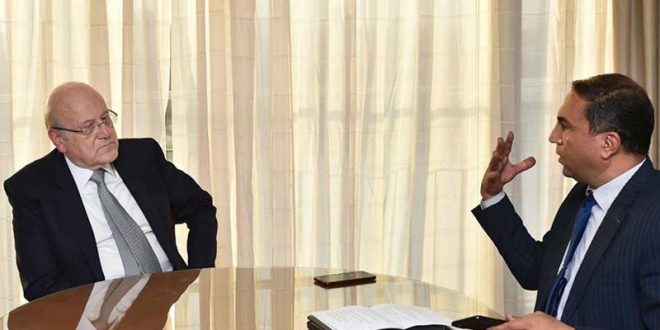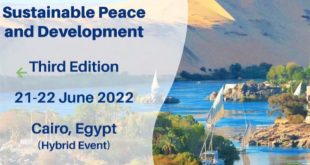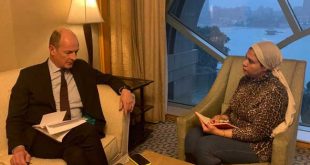Mohamed al-Qazzaz – Ahram Online
Discussing Egypt’s cooperation with Lebanon to solve the countries energy crisis and develop its economy, Al-Ahram Daily Newspaper interviewed Lebanese Prime Minister, Najib Mikati, during his first official visiti to Egypt on Thursday.
First of all, how would you describe your visit to Egypt and meeting with President Abdel-Fattah al-Sisi?
First, I am happy to visit Egypt and to meet His Excellency President Abdel-Fattah al-Sisi. Our meeting was extremely fruitful where I found someone who is sad about the current situation of Lebanon. Sisi spoke about Lebanon and the Lebanese people. He noted the importance of political and economic reforms in Lebanon, and that they must focus on the needs of Lebanese citizens. This gives us a great incentive to continue our work.
How do you view the current efforts to boost economic cooperation between Egypt and Lebanon, especially after the agreement between the Lebanese government and the Arab Contractors in August 2021 to develop the port of Tripoli?
When we signed the contract with the Arab Contractors Company to develop the port of Tripoli, it was a happy hour for us. First, for my hometown Tripoli to expand its infrastructure; making this vital port fully functional, and second, to have an Egyptian company with the history of Arab Contractors performing the project is a great opportunity.
During my visit I was informed that work will commence soon, and that everything is moving as planned, considering the funding and implementation of all the terms in the agreement.
What stops Lebanon from importing gas from Egypt? Especially since there are still challenges facing this project. Is there a timetable for its implementation?
The only challenge for the Egyptian gas to reach Lebanon is that it must pass through Syria. However, there is a US legislation the Caesar Act, which imposes sanctions on whoever gives financial and technical support to the Syrian government. For the gas pipeline to pass through Syria, the Egyptian and Jordanian governments received a written approval from the US administration as an exemption to the project from the Caesar Act. It was a relief for Egypt and Jordan, and of course for Lebanon.
Therefore, we agreed with the Egyptian government to provide Lebanon with 650 million cubic metres of gas a year.
In our meeting with President al-Sisi, we asked to increase this quantity and he promised to review the matter. The Egyptian government will deliver gas to Lebanon, after carrying out the necessary repairs on the gas pipeline from Syrian borders to electricity plants in Lebanon.
There are reports that the Arab gas pipeline has been dormant for 10 years, and the Syrian electricity grid is dilapidated. How are you going to deal with these challenges?
For this reason, we are asking for its rehabilitation, and we agreed with an Egyptian company to carry out this rehabilitation.
What is your opinion of the diplomatic, economic and political crises facing Lebanon?
Since when has Lebanon not seen crises in the past decades? Lebanon is always besieged with crises.
Unfortunately, the current implementation of Taif agreement and the constitution resulted in crises rather than solving crises. There are many articles and provisions which have not been implemented like the Constitutional council, the Senate and the cancellation of political sectarianism.
We are moving against the roadmap set by the Taif agreement, unfortunately.
You stated that the Lebanese government is working, but at the same time cabinet meetings are suspended due to the boycott of the Shia duo; Hezbollah and the Amal movement. Can you explain this contradiction? And, how are government decisions discussed and taken?
Today, we have a faction of the Lebanese society boycott the meetings of the cabinet and so I, as Najib Mikati, call for reconciliation and cohesion…
Therefore, I work in the government as well as with ministers individually or with a group of them to implement the plans we have without returning to the cabinet.
Many say that the cabinet won’t hold a meeting if Judge Tarek Bitar, who leads the investigations of the 2020 Beirut Port explosion, is not dismissed?
The cabinet will hold its meeting in the right time, but concerning Judge Bitar, the government does not interfere in the work of judiciary. I am one of the people who signed the draft law to establish an independent judicial authority, and I can’t contradict myself by interfering in the investigation.
I have never interfered in the judiciary ever. I have never spoken with a judge in my political career.
What is the link between the return of cabinet meetings and the dismissal of Judge Bitar?
There is a constitutional order that stipulates those precedents. Ministers and members of parliament stand trial before the Supreme Council of the Trial of Ministers and Presidents. It is a high court with eight judges, and seven deputies.
As Judge Bitar pursues a former prime minister and ministers, those defendants and witnesses should not be referred to trial or stand for trial before the Supreme Council until the parliament says its word on this matter.
I want a separation of powers in Lebanon; there is a military court for the military in Lebanon, and judicial inspection of judges, ministers and presidents have a special body too.
Frankly speaking, there is a constitutional principle, which higher than a law that must be respected.
What are the current priorities of the Lebanese government?
There are many different priorities like, safeguarding internal security, border security and security with United Nations Interim Force in Lebanon (UNIFL), financial issues and social issues.
There are three more extremely important priorities: first: the financial issue, the talks with the International Monetary Fund (IMF) and the plan to return deposits to depositors. Second: to solve the electricity crisis. And third: to hold parliamentary elections on time.
Lebanon began discussing economic reforms with the International Monetary Fund (IMF). How will the angry Lebanese street tolerate these reforms and what is the role of the government in this?
The demands of the IMF were nearly implemented without making demands on the Lebanese people in terms of lifting subsidies on goods. Today… nothing is subsidised in Lebanon whether medicine or energy or food. The important measures have been carried out and the Lebanese citizen is fully aware that this is one of the conditions to reach an agreement with the IMF.
In April 2020, there was a complete reform plan to end Lebanon’s financial, economic and social crises, but the Lebanese banks objected to the plan. Is there another reform plan you are working on?
Yes, there is a new reform plan, which took into consideration both the rights of the depositors and the interest of the banks in addition to restructuring the banking system, which is an essential thing to us.
After the visit of French President Emmanuel Macron to Saudi Arabia and the resignation of the Information Minister George Kordahi last week, are there any other steps to restore relations with the Gulf state?
For Lebanon and the Lebanese, we have never thought of cutting relations with any Arab country. We are Arabs and we need our Arab brothers and relations between Arab countries must be brotherly Diplomatic relations will be restored at the right time.
Following the resignation of Information Minister George Kordahi, are you thinking about appointing a new minister or is there is a push to abolish the Ministry of Information; considering that reforms declared by the government in October 2019, following the mass protests, considered abolishing the ministry and replacing it with a national council for visual and audio media?
Frankly, I can’t summarise the whole issue. His excellency President Michel Aoun and I accepted the resignation, but we have not resolved yet the matter of appointing a new minister. I have not discussed with President Aoun appointing a new minister for information, especially since the Ministry of Information does not have a big responsibility.
Currently, the Minister of Education and Higher Education Abbas al-Halabi is appointed as acting information minister until we decide on the matter.
The implementation of the 2006 UN Security Council Resolution 1680 on the demarcation and control of the Lebanese-Syrian border is of great importance. What are the Lebanese government’s steps on implementing the resolution?
For our part, we are ready to demarcate the Lebanese Syrian border, but can we define these borders on our own? We must start discussing this issue with our Syrian brothers in a fraternal and friendly way, not in a way imposed on us by outside parties. When we and the Syrians sit at a table, we will inevitably reach a solution.
From time to time, there are demands to reconsider the Taif Agreement and agree on a new National Charter. How do you see those demands?
Frankly, the Taif Agreement and the constitution are still the best to govern Lebanon, but there is mismanagement and mis-implementation in addition to the failure to complete the agreement.
Before calling for an amend to the Taif Agreement, we should agree to fully implement its points. Maybe this will lead us to a Lebanon with a modern electoral system which leads to a non-sectarian House of Representatives and a Senate to protect the rights acknowledged in the Taif agreement.
All those matters and issues are mentioned in the Lebanese constitution and the Taif agreement. It should be implemented correctly.
Some argue that there are parties wish to prevent or postpone parliamentary elections by fabricating security threats or exploiting the economic crisis. What do you think about this claim?
No one can disrupt the parliamentary elections next year. No one can ask for the postponement of the elections. I know that some people do not want to hold elections, I will not entertain debate on the subject. No one can say that I am disrupting the elections.






